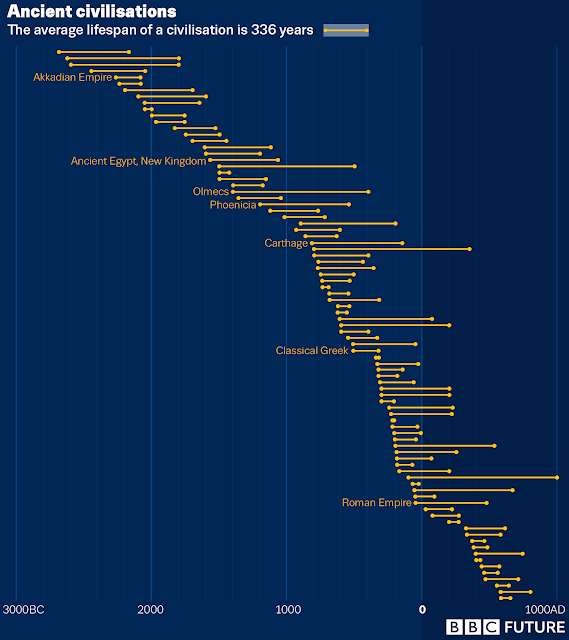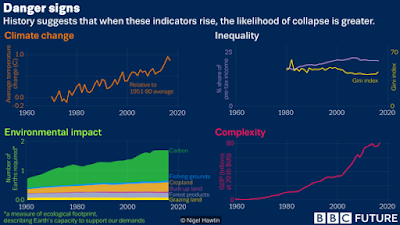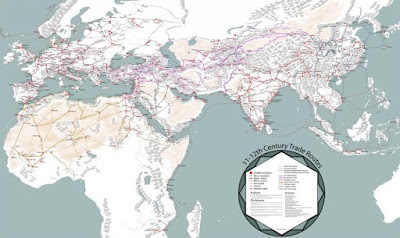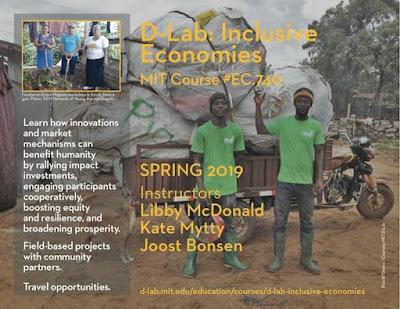
23 February 2019
US Employment ~ Visualizing Changes over Time
Visual Capitalist shares US Employment History and changes afoot... 

19 February 2019
Civilizational Endurance ~ Causes of Collapse...
Luke Kemp at the BBC asks Are we on the road to civilisation collapse?


"If the fate of previous civilisations can be a roadmap to our future, what does it say? One method is to examine the trends that preceded historic collapses and see how they are unfolding today. [...] The collapse of our civilisation is not inevitable. History suggests it is likely, but we have the unique advantage of being able to learn from the wreckages of societies past. [...] We will only march into collapse if we advance blindly. We are only doomed if we are unwilling to listen to the past."

"Collapse is a tipping point phenomena, when compounding stressors overrun societal coping capacity. We can examine these indicators of danger to see if our chance of collapse is falling or rising. Here are four of those possible metrics, measured over the past few decades:"

Labels:
BBC,
Civilization,
Forecast,
Future,
history,
Trendscape
Medieval Trade Routes ~ Well Beyond Silk...
Medieval Trade Routes zoomable map! 

18 February 2019
Marine Protected Areas ~ Conserving the Seas
The BBC's Ade Adepitan visits the coast of Gabon which has implemented a substantial Marine Protected Area off its coast. I've been moved by the idea that half of Earth should be set aside in nature protection reserves. That is, half for animal kingdom, half for humanity. Right now, there's a lot more work to be done. Here's the biggest of the MPA's... 

09 February 2019
AI for Impact ~ Spring'19 @ MIT Media Lab...
Together with colleague Ramesh Raskar, I'm co-teaching the AI for Impact seminar this Spring 2019 every Mon afternoon starting Feb 11th from 2:30-4:30a in E15-341, the heart of the MIT Media Lab! Our goal is to bring computational, analytics, and AI techniques to bear on solving problems in the high impact realms of health & wellness, cities & sustainability, across scales of action from each of us as individuals to embracing all of humanity, in both developed and emerging markets alike, all broadly understood. We want to help students identify top AI opportunities for impact and help make progress towards building prototypes, planning action ventures, and/or better understanding the emerging technology and impact trendscape. Formerly known as "Imaging Ventures" or “AI Ventures”, this “AI for Impact” class seeks answers to the question: If you could make almost anything, what's actually most worth making, i.e. what problems are most worth picking? We believe starting with the right problem is 90% of what makes for great projects and ultimately epic, worthy solutions.
Labels:
2019,
AI,
Engineering,
Envisioning,
Impact,
Media,
Media Lab,
MIT,
Ventures
05 February 2019
Inclusive Economies ~ Spring'19 D-Lab Seminar
Together with colleagues Kate Mytty and Libby McDonald, I'm co-teaching the Inclusive Economies seminar this Spring 2019 every Wed morning starting Feb 6th from 9:30-11:30a in N51-350, the D-Lab classroom area! We explore how innovations and market mechanisms can benefit humanity by rallying impact investments, engaging participants cooperatively, boosting equity and resilience, and broadening prosperity. We look at market mechanisms for maximizing participation, choice, and growth; impact investing approaches which are socially responsible and include metrics that matter; cooperative and mutual ownership structures for shared gains; equitable citizen participation in basic and natural resource wealth; and the role of new technologies and methods towards boosting affordability, accessibility, and overall inclusive prosperity. 

Subscribe to:
Posts (Atom)






